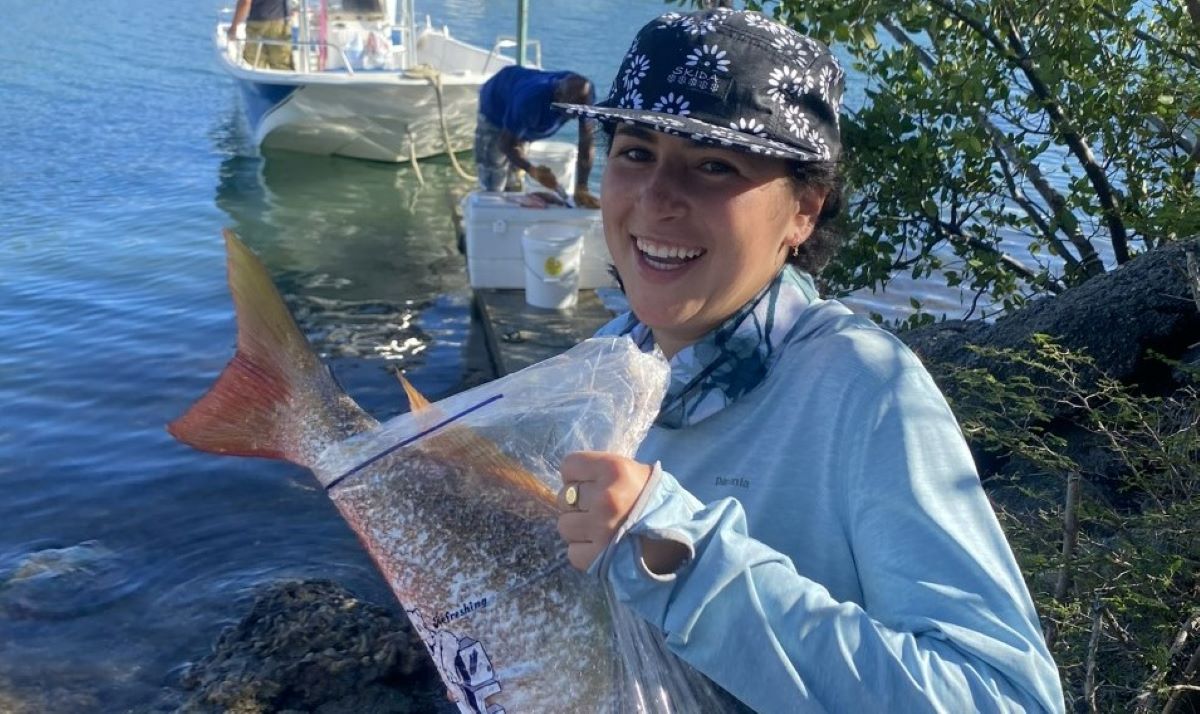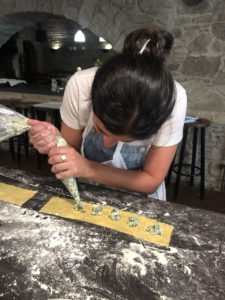New Fellow Hillary Swimmer on Charting a Course in Food Systems Work
- by bonappetit

Hillary bags a fish during an ecological research trip with Colby College
Food has always played a leading role in my life, even before I discovered that it could be a career.
My most cherished memories all surround food: listening to the Dave Matthew’s Band with my parents on our back porch every night of the summer while grilling our family’s famous lamb burgers, harvesting Sungold cherry tomatoes with my mom in our garden talking about my life at Colby College and eating countless dinners of eggplant parmesan with my friends at Colby.
My discovery of the true complexities of our food system began when I was in high school. My junior year, I got to choose between two elective classes: Computer Engineering and a class called Food: Science, Systems, and Society. It seemed like the easier choice was the class about food. How much work could it be to talk about food in school, right?
The class turned out to be a lot of work but it exposed me to what I want to devote my life to. I would come home after school frantic to share newfound information about our food system with my parents. “Corn is terrible! We need to stop consuming processed goods with corn syrup – it’s causing so many human and environmental health problems!” I would exclaim to them, a new nugget of knowledge daily. In an effort to satisfy my desire to learn about our food system, my mom bought me a book, “From the Ground Up: A Food Grower’s Education in Life, Love, and the Movement That’s Changing the Nation” by Jeanne Nolan.

Hillary makes ravioli during a trip to Italy
The memoir chronicles Nolan’s experience of growing up as a Jewish girl on the North Shore of Chicago, an upbringing identical to my own. Nolan left home to work on various communal farms, and returned to start The Organic Gardener, a company that installs gardens at homes, restaurants, schools, and corporations around Chicago. Inspired, I made it my mission to work for her. Thankfully, I was successful.
I spent a summer interning with The Organic Gardener, learning a lot and falling even more in love with food. As a ceramicist, I had always been excited about working with my hands, so physically growing my food was exactly in my wheelhouse. I loved the scavenger hunt I went on through the leaves of haricot verts when harvesting its beans, the way the snap pea tendrils would adoringly wrap around the neighboring tomato plants, and the way zucchini would grow so large without any remorse. This first growing experience led me to work on Elawa Farm, a small-scale farm in Chicago. Later, I participated in World Wide Opportunities on Organic Farms (WWOOF) in Hawaii for a month as part of research for my major in college.
Going to school at Colby College in Waterville, Maine exposed me to an entirely new and complex part of our food system. I chose to major in Environmental Policy, as it seemed like the closest to anything food systems related. In Maine, much of the culture, livelihoods, and environmental policies surround the seafood industry. This meant that I took classes from professors who were experts in the subject and many of the local environmental issues and the policies that addressed them were seafood related. I was fascinated with the sheer number of fragilities and intricacies in this industry and took classes like Seafood Forensics of Marine Fisheries Management.
This newfound interest led me to intern for two amazing, Maine-based companies. The first was Gulf of Maine Research Institute (GMRI), where I mapped out how GMRI’s work supported Maine’s new climate legislation. Much of this work surrounded how the fishing and aquaculture industries could adapt to and mitigate climate change. The other was Bristol Seafood where I worked on getting the business B Corp certified. This experience gave me a practical viewpoint on how food companies can operate. These two positions were critical to my understanding of positive changes being made in our food system through market power.
Now, working as the West Coast Fellow for Bon Appétit, I can confidently say that I have my dream job. I feel so fortunate to be able to share my passion for sustainable food with students and continue to learn about a topic that I can’t get enough of!